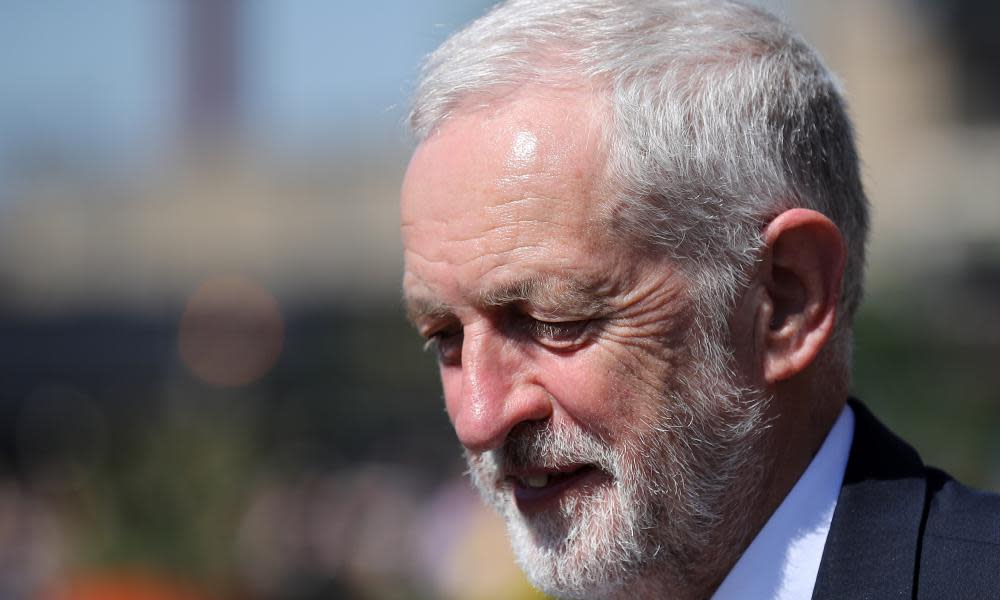Corbyn presses May to end Stormont deadlock in Northern Ireland

Jeremy Corbyn is calling on Theresa May to reconvene the British-Irish intergovernmental conference, set up under the Good Friday Agreement, to help restore the power-sharing government to Northern Ireland.
The proposal, due to be announced on Thursday, risks angering unionists as the high-level body, which last met more than a decade ago, would give Dublin a formal role in breaking the deadlock at Stormont.
Ahead of his first visit to Northern Ireland since he became Labour leader, Corbyn’s spokesman also confirmed he still believed in Irish reunification. However, he insisted that it was now a “matter for the people” to decide that through the process set out in the Belfast agreement.
In a speech at Queen’s University Belfast on Thursday, Corbyn was expected to say: “Devolution and power-sharing have given every community a voice and helped maintain the peace process. If the current stalemate in Stormont cannot be sorted out in Belfast, I call on the UK government to reconvene the British-Irish intergovernmental conference.
“We must step up to find a creative solution, in the spirit of the Good Friday Agreement, that avoids a return to direct Westminster rule and lays the ground for further progress for all communities.”
Northern Ireland has been without a devolved government since January last year, when a coalition led by the DUP and Sinn Féin collapsed. Since then, day-to-day government business has been administered by civil servants.
Corbyn, who has already come under pressure over his association with the Irish republican movement in the 1980s and 90s, risks reigniting old tensions. His proposal to give Dublin a formal say comes just after Sinn Féin’s deputy leader, Michelle O’Neill, made the same demand.
The DUP’s chief whip, Sir Jeffrey Donaldson, insisted that the conference should not have a role in restoring power-sharing at Stormont, calling the proposal “totally unacceptable”. “Jeremy Corbyn should know the principle of consent is written into the agreement, is enshrined in our own constitutional arrangements and the Irish constitution, and therefore any attempt to give Dublin a say on the assembly would be a breach of the agreement and of the principle of consent,” he told the Guardian.
“The focus for the conference should be on east-west, certainly not on the internal situation in Northern Ireland. Any notion that would involve joint authority or a formal arrangement for Dublin would be totally unacceptable to unionists.”
Labour sources suggested that Corbyn, who has claimed that he played a role in peace-building, would meet people from “across the spectrum”, including unionists, on the two-day visit, but did not reveal whether this included politicians.
His spokesman suggested that the Labour leader continued to support a united Ireland. “Over the years he made his position clear that a majority of those people across the whole island of Ireland wanted to see that outcome – a united Ireland,” he said.
“But in the context of the Good Friday Agreement, that can only come about through that constitutional process that’s laid down in that agreement, and Jeremy fully supports that.”
In his speech, Corbyn is expected to call for the spirit of the Good Friday Agreement, which marks its 20th anniversary this year, to be applied to breaking the deadlock at Stormont. “Look back at the sacrifice and courage shown at all levels of society that paved the way for something that had once seemed impossible. That was the spirit of the Good Friday Agreement.
“We all need that spirit again – Stormont and Westminster parties, the British and Irish governments, business and unions, UK and EU negotiators – if we want to secure 20 more years of peace and greater prosperity for the many, not the few.”
Corbyn will also put pressure on the government over the threat of the return of a hard border, declaring that Labour would not support any Brexit deal that delivered one. “Opposition to the idea of bringing back a hard border to this land isn’t just about avoiding paperwork or tariffs, important though that is; it’s about deep-rooted cultural and community ties,” he is expected to say.
“An open border is a symbol of peace, two communities living and working together after years of conflict, communities who no longer feel that their traditions are under threat.”

 Yahoo News
Yahoo News 
